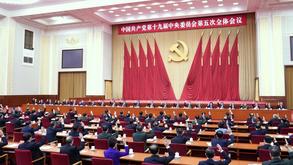 This undated photo shows the Political Bureau of the Communist Party of China (CPC) Central Committee presiding over the fifth plenary session of the 19th CPC Central Committee in Beijing, capital of China. (PHOTO / XINHUA)
This undated photo shows the Political Bureau of the Communist Party of China (CPC) Central Committee presiding over the fifth plenary session of the 19th CPC Central Committee in Beijing, capital of China. (PHOTO / XINHUA)
BEIJING - The Communist Party of China (CPC) on Tuesday unveiled in full text the Party leadership's proposals for formulating the 14th Five-Year Plan (2021-2025) for National Economic and Social Development and the Long-Range Objectives Through the Year 2035.
It is a major document to guide the development of the world's second-largest economy for the next five to 15 years.
So, how was it drafted? According to people familiar with the drafting, the process featured both top-level design and public opinions.
The process officially kicked off on April 13 when a drafting group headed by Xi Jinping, general secretary of the CPC Central Committee, held its first plenary meeting.
Shedding light on the document's title, Xi said combining the five-year plan and the long-range objectives through 2035 will give the document a stronger sense of direction, as well as historical and strategic importance
ALSO READ: CPC sets course for China's long-term growth
At the meeting, Xi highlighted 38 important issues for the drafting group to begin with. Two days later, the group swung into action in full throttle.
On June 17, Xi convened the group's second plenary meeting, where the structure of the document was discussed.
Shedding light on the document's title, Xi said combining the five-year plan and the long-range objectives through 2035 will give the document a stronger sense of direction, as well as historical and strategic importance.
Taking the details into consideration, Xi divided the group into task divisions and proposed seven specific highlights for the draft, including placing an emphasis on doing China's own things well, upholding reform and opening-up, and prioritizing technological innovation.
Xi stressed the importance of hearing people's voices. On Sept 17, he presided over a meeting with grassroots representatives and talked with the speakers from a broad spectrum of professions: rural teacher, migrant worker, truck driver, etc.
Between July and September, Xi presided over seven symposiums to solicit opinions and suggestions from entrepreneurs, non-CPC personages, experts in economic and social fields, scientists as well as experts in education, culture, health and sports.
Comments were also solicited online, and in just two weeks, over 1 million pieces of comments were collected.
Xi asked relevant departments to sort, analyze and absorb the comments, and urged further efforts to use the internet to listen to the people's voices.
"The task of collecting suggestions for the development plan proposals has been unprecedentedly extensive," said a member of the drafting group.
Xi convened a series of high-level meetings, including three meetings of the Standing Committee of the Political Bureau of the CPC Central Committee and two meetings of the Political Bureau of the CPC Central Committee, to review the draft document, before it was submitted to the fifth plenary session of the 19th CPC Central Committee.
On Oct 26, Xi made an explanatory speech on the draft to the session before deliberation started. Almost all attendees spoke during the discussions, putting forward more than 290 suggestions.
Based on their opinions, the drafting group made 31 modifications.
READ MORE: CPC Central Committee elaborates on plenary vision
In the evening of Oct 28, Xi presided over a meeting of the Standing Committee of the Political Bureau of the CPC Central Committee to review the revised draft.
The next morning, the revised draft was submitted to the session for another deliberation, and the drafting group made modifications according to new suggestions of the attendees.
The document was finally adopted in the afternoon of Oct 29.
Xi said the document will serve as a guide for China's development course in the next five years and beyond. "It is a guiding document for the march toward the second centenary goal," he added.


